-
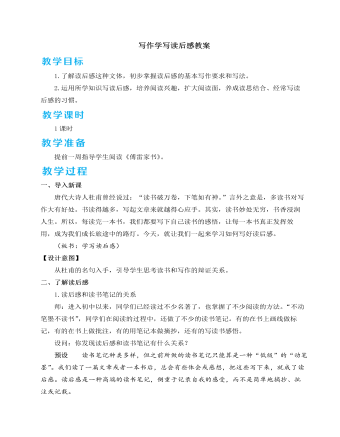
人教部编版语文八年级下册写作学写读后感教案
师小结:本篇习作开篇概述原作内容,抓住要点,简明扼要。感想的内容,先扣住深沉的父爱,表达自己对傅雷的敬意,然后赞美现实生活中父爱的伟大。思路清晰,情感真挚。【设计意图】以《傅雷家书》读后感写作为例,指导学生如何写读后感。重点指导“点引议联结”的基本结构,让学生写作有章可循。四、尝试写读后感1.写作内容师:同学们已经阅读了《傅雷家书》,请大家回顾内容,自拟题目,按照今天讲的写读后感的方法,先列出写作提纲,再写成作文,不少于600字。2.能力提升用已学的读后感知识,修改自己的作文。并反思所写读后感是否有以下不足:(1)以“引”代“感”。读后感,顾名思义,主要是写“感”,引述是为写“感”服务的,但有些同学往往忘记了这一条,本末倒置,大量抄录或复述原文,结果犯了以“引”代“感”、代“联”的毛病。
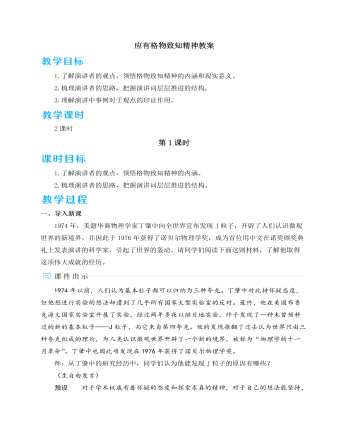
人教部编版语文八年级下册应有格物致知精神教案
1.了解演讲者的观点,领悟格物致知精神的内涵。2.梳理演讲者的思路,把握演讲词层层推进的结构。 一、导入新课 1974年,美籍华裔物理学家丁肇中向全世界宣布发现J粒子,开辟了人们认识微观世界的新境界,并因此于1976年获得了诺贝尔物理学奖,成为首位用中文在诺奖颁奖典礼上发表演讲的科学家,引起了世界的轰动。请同学们阅读下面这则材料,了解他取得这项伟大成就的经历。1974年以前,人们认为基本粒子都可以归纳为三种夸克。丁肇中对此持怀疑态度,但他想进行实验的想法却遭到了几乎所有国家大型实验室的反对。最终,他在美国布鲁克海文国家实验室开展了实验,经过两年多夜以继日地实验,终于发现了一种未曾预料过的新的基本粒子——J粒子,而它来自第四夸克。他的发现推翻了过去认为世界只由三种夸克组成的理论,为人类认识微观世界开辟了一个新的境界,被称为“物理学的十一月革命”。丁肇中也因此项发现在1976年获得了诺贝尔物理学奖。
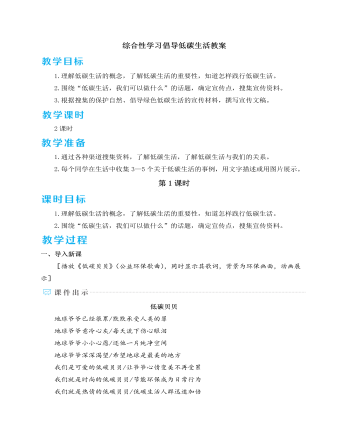
人教部编版语文八年级下册综合性学习倡导低碳生活教案
一是缩小页边距和行间距,缩小字号。正式文件一般对字号、间距有严格的要求,但是在非正式文件里,可适当缩小页边距和行间距,缩小字号。可“上顶天,下连地,两边够齐”,对于字号,以看清为宜。二是纸张双面打印、复印。纸张双面打印、复印既可以减少费用,又可以节能减排。如果全国10%的打印、复印做到这一点,那么每年可减少耗纸约5.1万吨,节能6.4万吨标准煤,相应减排二氧化碳16.4万吨。三是打印时能不加粗、不用黑体的就尽量不用,能节省墨粉或铅粉。此外,能够用电脑网络传递的文件就尽量在网络上传递,比如电子邮件、单位内部网络等,这样下来也可以节约不少纸张。(选自《低碳校园——让我们的学校更美好》,天津人民出版社2013年版)(学生围绕各自任务,课外搜集制作宣传材料,时间为一周。)【设计意图】本环节先从探讨自身在低碳生活中力所能及的事情,让学生切实认识到低碳生活就在日常的一举一动中。然后围绕主题分组,并保证足够的时间,让学生去收集整理资料,落实任务,使学生能真正成为低碳的倡导者和践行者。
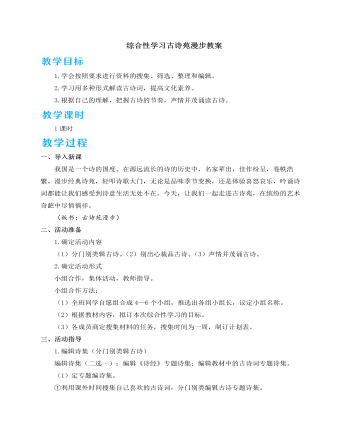
人教部编版语文八年级下册综合性学习古诗苑漫步教案
解说词:画卷上的竹子,在石缝中挺然而立,坚韧不拔,遇风不倒。郑板桥先生借竹抒发了自己的洒脱与豁达,表现了他勇敢面对现实、绝不屈服于挫折的品性,令竹子人格化了。此时,“诗是无形画,画是有形诗”。4.声情并茂诵古诗(播放相关的主题图片和音乐,尽量让诗歌和音乐、画面相融合)主持人:诗除了追求意境的图画美之外,还特别注重节奏和韵律,具有音乐美。我们理解了诗中的情愫后,便可以通过朗读来诠释这种种情愫,或低声絮语,或慷慨悲吟,或温情述说……请大家选择自己最喜欢的一首诗词或一小节诗歌,用你认为最贴切的情感和方式朗读,并说出这样处理的原因,或讲述你与此诗有关的故事。朗读示例:无言/独上西楼,月/如钩,寂寞梧桐/深院/锁/清秋。剪不断,理还乱,是离愁,别是/一般滋味/在心头。解说词:此词是南唐后主李煜被囚于宋时所作,表达了他离乡去国的锥心之痛。朗读时要表现出那种深切的故国之思、亡国之恨。
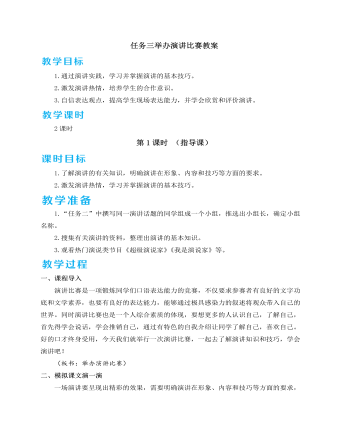
人教部编版语文八年级下册任务三举办演讲比赛教案
本环节通过评委宣布比赛规则和评分细则,为下面比赛活动中,学生学会欣赏和评价演讲打下基础。三、八仙过海赛一赛(主持人组织演讲比赛)演讲比赛的程序:1.各组参赛同学抽签,确定演讲顺序。2.参加比赛的同学按照顺序进行演讲,每位选手演讲完毕,评委现场打分。3.评委根据评分细则评分,去掉最高分和最低分,记分员核算出选手的平均分,并由主持人公布最后得分。4.每位参赛者演讲结束,评委和教师进行简要点评。5.第二轮由每组得分最高的选手进行即兴演讲拉票,决出班级前三名。6.主持人宣布比赛结果。7.活动结束。【设计意图】本环节通过演讲比赛和评价两个活动的交互进行,让学生进一步理解演讲技巧的具体运用方法,从而提高演讲能力。在整个演讲活动中,学生组织活动和实施活动的能力可以得到充分地展现和发挥。四、尺短寸长评一评1.精彩的演讲结束了,在这次演讲比赛中,给你留下深刻印象的演讲有哪些?请说明理由。(生自由发言,对演讲活动进行总结评价)2.在这次精彩的演讲比赛中,大家有哪些收获?请结合活动过程具体来谈。
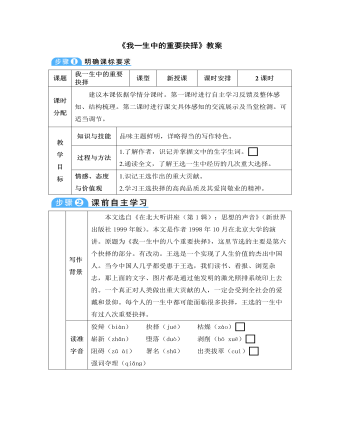
部编版语文八年级下册《我一生中的重要抉择》教案
(1)一个快落山的太阳,跟大家讲的,更多的是自己一生奋斗过来的体会。指61岁的老人。(2)加入人家说我是权威,也许还马马虎虎。作者自谦的说法,指成绩还过得去。(3)明明是一个过去时态,大家误认为是现在时态。指作者认为自己不适合再做权威了。(4)扶植年轻人我觉得是一种历史的潮流,当然我们要创造条件,就是把他们推到需要刺激的风口浪尖上。比喻重要的岗位或市场的前沿。【感悟精彩句子】1.所以我知道自己是一个下午四五点钟的太阳。各位呢,上午八九点钟的太阳,这是本科生;硕士生呢,九十点钟的太阳;博士生呢,十点十一点钟的太阳。比喻,拉近了与听众的距离,倍感亲切、期望和鼓舞。2.所以1992年前电视台采访我,我基本上都拒绝了。透过细节,体现了坚持不懈的科研精神。
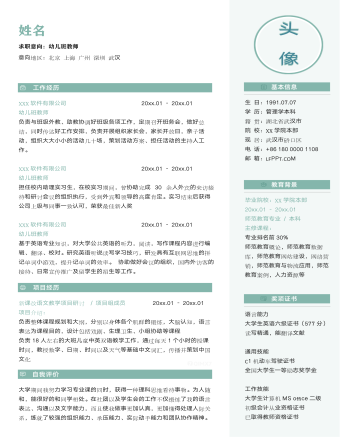
英语外教幼儿班实习教师简历
新课改语文教学项目研讨 / 项目组成员 20xx.01 – 20xx.01项目介绍:负责整体课程规划和大纲,分别以身体各个肌群的锻炼,大脑认知,语言表达为课程目的,设计包括戏剧、生理卫生、小组协助等课程负责18人左右的大班儿童中英双语教学工作,通过每天1个小时的授课时间,教授数字、日期、时间以及天气等基础中文词汇,传播并策划中国文化
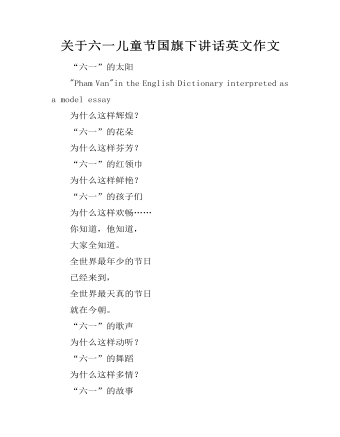
关于六一儿童节国旗下讲话英文作文
“六一”的太阳"Pham Van"in the English Dictionary interpreted as a model essay为什么这样辉煌?“六一”的花朵为什么这样芬芳?“六一”的红领巾为什么这样鲜艳?“六一”的孩子们为什么这样欢畅……你知道,他知道,大家全知道。全世界最年少的节日已经来到,全世界最天真的节日就在今朝。“六一”的歌声
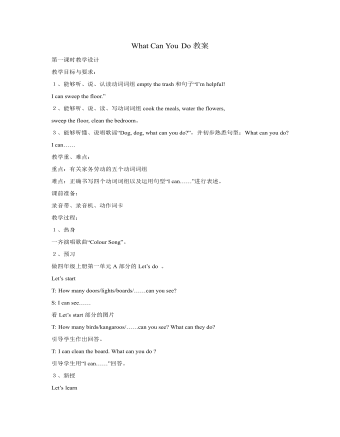
人教版新课标PEP小学英语五年级上册What Can You Do教案
1、能够听懂、会说:Can you ……?Yes, I can./No, I can’t, but I’d like to have a try!并能在情景中运用。2、能够完成Task time中的任务。教学重、难点:重点:Can you ……? Yes, I can./No, I can’t.难点:I’d like to have a try. 以及在实际情景中正确运用所学对话。课前准备:录音带、录音机、动作词卡教学过程:1、 热身(1) 放歌谣,学生边说边做相应的动作。(2) 将动词编入歌谣,有节奏地说唱。2、 预习(1) 听数字,报词组。(2) 做“少了什么?”游戏。(3) 学生拼读四会词组并仿写。3、 新授Let’s try(1)教师向学生展示挂图,放录音,学生用彩笔连线,完成练习。录音内容如下:①Boy: I can make the bed. I can do the dishes. And I can empty the trash.②Girl: I can sweep the floor. I can cook the meals. I can wash the clothes.Listen and link. Who are they?(2)教师检查并指导学生完成连线。(3)师生、生生问答操练:Can you ……?Yes, I can. /No, I can’t.Let’s talk(1)教师放录音,学生跟读。注意“but I’d like to have a try!”的发音和意思。(2)学生四人小组进行对话操练,然后上台表演对话。(3)请若干女生上台,做连锁问答游戏。
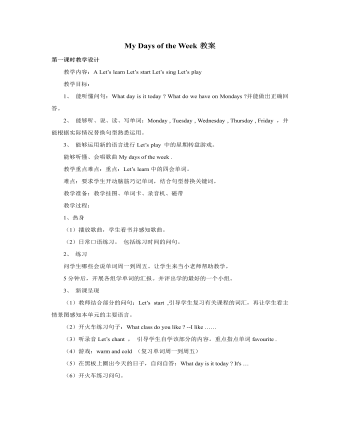
人教版新课标PEP小学英语五年级上册My Days of the Week教案
1、 热身日常口语练习。2、 预习引导学生使用第四课时学过的单词和句型:What do you do on Saturdays? I often do my homework .并结合周末活动的照片复习四会单词和词组,为本课时对话的学习做好准备。3、 新课呈现Let’s try (1)在预习部分操练新词组之后,教师可询问学生的周末安排,然后出示本课时Let’s try部分的挂图,让学生根据挂图说一说这些人物的周末活动,将听与说相结合,适当减缓Let’s try 听力练习的难度。听录音,完成听音圈图的练习。Let’s talk (1)在部分听觉感知新句型的基础上,教师让学生看挂图听录音。(2)跟读对话。Pair work 朗读对话之后,让学生结合自己的实际情况在同桌之间结对交流。Let’s check 播放录音,让学生按照录音内容做练习。第六课时教学设计教学内容:B Read and write Group work C Task time教学目标:能听懂、会说:并能在情景中运用。
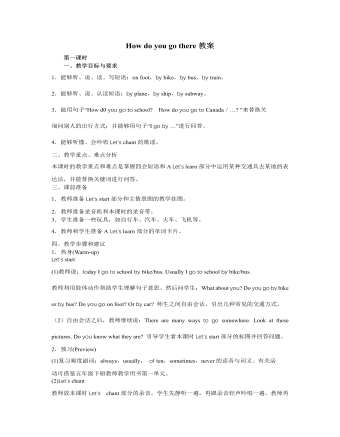
人教版新课标PEP小学英语六年级上册How do you go there教案
教师检查有多少学生能够准确区分14与40的发音,如果答对率低,教师要注意纠正。教师还可以板书一组相似的数字,如:13/30,18/80,15/50,教师说英文,学生说出中文的数字,帮助学生区分/-ti:n/与l-u/。 3.新课呈现(Presentation) Let’s talk (1)教师根据学生平时常去的场所提问,如当地的一家电影院、风景点、或学生的祖父母家等:“How can you get to…? Can you go by …? Is it fast/slow/expensive to go by …? ”进行师生间的自由会话,再让学生感知一下新句型:How can I/ you get to…? 然后,教师请学生根据课本中提供的地图回答问题:“How can I get to Zhongshan Park? ”引导学生回答,提示他们坐15路公交车为:“By the No.15 bus.”教师提供完整的答句:“Yes.I can go by the No.15 bus.”教师板书这组句子。 (2)教师继续提问:“It’s a place.You can buy food,drink,fruit,veget ables,school things and clothes there.What is it? (It’s a supermarket.)”教师最好出示一张当地比较有名的超市的照片或图片来给出谜底。教师再提问:“How can I get there? By bus or by bike? ”然后领读句子:“I can go to the supermarket by …”帮助学生理解supermarket是一个合成词,来源于super与market。
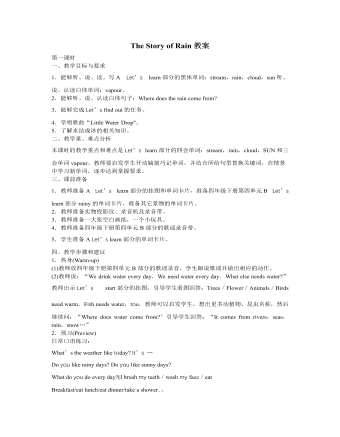
人教版新课标PEP小学英语六年级上册The Story of Rain教案
(2)教师说:“I am going to plant a flower on the weekend.But I don’t know hoⅥ do that.Can you tell me? Who knows?”教师提示学生可以适当用中文解释。如果有学生举手,教师就问:“OK.How d0 you do that?”引导学生回答。“First,put the seeds in the soil.”然后,教师接着说:“What should I do then? 引导学生回答“Water it. (3)教师说:“Zhang Peng is talking to h is teacher.Now Let’s see what they talking about.”学生翻开学生用书,教师放录音,学生跟读。教师解释In several days的意思是几天以后。”教师板书四会句型:How do you do that? What should you do then?学生仿写。 (4)同桌学生进行对话替换操练,可以谈论西瓜(watermelon)、小麦(wheat)等植物的种植过程。然后选几组在班上表演对话。 (5)教师指导学生运用主句型编对话。以下对话供参考: A:How do you clean the classroom? B:First.sweep the floor. A:What should you do after that? B:Then clean the desks and chairs.wash the windows. 4.巩固和延伸(Consolidation and extension) (1)做本单元B Let’s talk部分的活动手册配套练习。
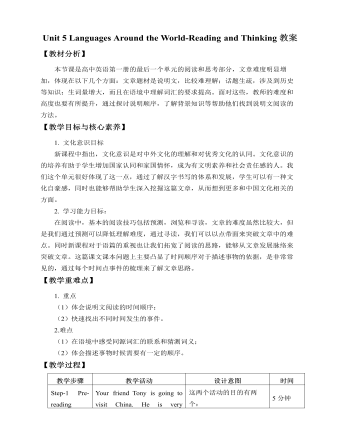
新人教版高中英语必修1Unit 5 Languages Around the World-Reading and Thinking教案
【教材分析】本节课是高中英语第一册的最后一个单元的阅读和思考部分,文章难度明显增加,体现在以下几个方面:文章题材是说明文,比较难理解;话题生疏,涉及到历史等知识;生词量增大,而且在语境中理解词汇的要求提高。面对这些,教师的难度和高度也要有所提升,通过探讨说明顺序,了解背景知识等帮助他们找到说明文阅读的方法。【教学目标与核心素养】1. 文化意识目标新课程中指出,文化意识是对中外文化的理解和对优秀文化的认同。文化意识的的培养有助于学生增加国家认同和家国情怀,成为有文明素养和社会责任感的人。我们这个单元很好体现了这一点,通过了解汉字书写的体系和发展,学生可以有一种文化自豪感,同时也能够帮助学生深入挖掘这篇文章,从而想到更多和中国文化相关的方面。2. 学习能力目标
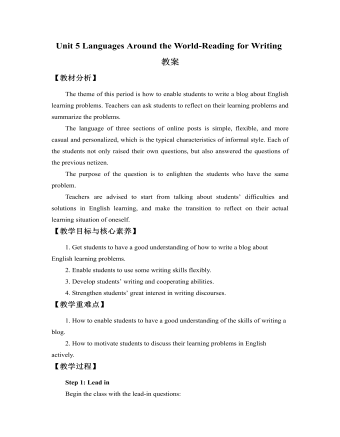
新人教版高中英语必修1Unit 5 Languages Around the World-Reading for Writing教案
Step 3: Read to sum upRead it again and sum up the problems of the three students, and then write down the advice that was given from others.Step 4: Work in pairs. List your learning problems in English and brainstorm some useful advice.Useful expressions ? I don't know how to…... Is a big difficulty for me. I cannot ...? You might try …. It's very important to…? I have no idea how/what .My biggest problem is .... ? I (also) have trouble with. My advice is …. This worked for me.? l cannot understand the teachers’ English in class.Step 5 Homework:为提高我校学生的英语口语水平,我们将举办英语演讲比赛(English- speaking contest),请你根据下面的信息,以学生会(the Students‘ Union)的名义写一份海报,欢迎全校同学参加,届时特邀本校美籍教师史密斯先生颁奖。? 报名时间 9月30日以前(报名:signup)? 报名地点 学生会办公室? 比赛时间 10月9日晚7:00~9:00? 比赛地点 学校大会议室? 奖励 前8名

新人教版高中英语必修2Unit 3 The Internet-Discovering Useful Structure教案二
This teaching period mainly deals with grammar “The Present Perfect Passive Voice.” To begin with, teachers should lead students to revise what they have learned about the Present Perfect Passive Voice. And then, teachers move on to stress more special cases concerning this grammar。This period carries considerable significance to the cultivation of students’ writing competence and lays a solid foundation for the basic appreciation of language beauty. The teacher is expected to enable students to master this period thoroughly and consolidate the knowledge by doing some exercises. 1. Guide students to review the basic usages of the Present Perfect Passive Voice2. Lead students to learn to use some special cases concerning the Present Perfect Passive Voice flexibly.2. Enable students to use the basic phrases structures flexibly.3. Strengthen students’ great interest in grammar learning.1. Help students to appreciate the function of the Present Perfect Passive Voice in a sentence2. Instruct students to write essays using the proper the Present Perfect Passive Voice.观察下列句子特点,总结共同点。1.(教材P28)Much has been written about the wonders of the World Wide Web.2.(教材P28)But the Internet has done much more for people than simply make life more convenient.3.(教材P28)Many people have been helped by the club.4.(教材P28)She no longer feels lonely, and her company has become quite successful.5.(教材P32)Today I thought I’d blog about a question that has been asked many times—how do you stay safe online and avoid bad experiences on the Internet?

新人教版高中英语必修2Unit 3 The Internet-Discovering Useful Structure教案一
This unit is about the Internet, which has a great influence to our humans and our lives. During the Listening & Speaking & Talking and Reading and Thinking section, the influence in examples has been shown. Thus, use the Present Perfect Tense is appropriate. However, in order to show the justice or weaken the doer of the behavior/action, it’s better to use the Present Perfect Passive Voice than the Present Perfect Tense. Besides, having learned to use the Present Perfect Passive Voice, students can beautify their language in their writing. 1. Learn the structure of the Present Perfect Passive Voice and its functions. 2. Learn to change the sentences with the Present Perfect Passive Voice into the sentences with the Present Perfect Passive Voice. 3. Learn to write sentences with the Present Perfect Passive Voice flexibly according to the context. 1. Learn the structure of the Present Perfect Passive Voice and its functions. 2. Learn to change the sentences with the Present Perfect Passive Voice into the sentences with the Present Perfect Passive Voice. 3. Learn to write sentences with the Present Perfect Passive Voice flexibly according to the context. Step 1 Observe the following sentences, then change the sentences into passive voice.He has been selected to take part in the sports meeting.(肯定句)他已被挑选出来参加运动会。The ink has not been removed from his overcoat.(否定句)墨迹还没有从他外套上去掉。

新人教版高中英语必修2Unit 3 The Internet-Listening &Speaking&Talking教案二
From the pictures in the text and the title--- choose the best app, we can know that this part is about how to save money by using apps.Step 2 While-listening1. Laura and Xiao Bo are talking about apps. Listen to their conversation and find out what apps they want.Xiao Bo is looking for a(n) exercise app to help him get in shape.Laura would like an app for getting rich and another that will make her grades better.2. Listen again. Are the sentences true T or false F?1). Both of Xiao Bo's apps keep track of the steps he takes._____2). Xiao Bo's second app can help him make a fitness plan._____3). Laura needs an app that will help her get discounts.______4). Laura needs an app that will add money to her bank account._______F T F T3. Listen once more and tick the sentence you hear. Underline the words used to express predictions, guesses, and beliefs.Predictions, Guesses, and Beliefs________It might help me walk more.________My guess is that it wouldn't work.________I imagine this app would help me get fit faster________I suppose that would be good.________I guess you could save a little with this app.________I suppose there would be some problems, too.________I believe this app could help me get thinner.

新人教版高中英语必修2Unit 3 The Internet-Listening &Speaking&Talking教案一
Listening and Speaking introduces the topic of “ask about online habits”. Many middle school students have been surfing the Internet for many years, but what they do with the Internet and how much time they spend every day may not be very clear to themselves, nor to other students. This section allows students to investigate their peers' Internet use, which is conducive to their mutual understanding and understanding of the Internet. It can also help them reflect on their own online behavior, learn from other people's good online habits, and get rid of their bad online behavior.The listening text of this section is an investigation interview. The investigators interview specific groups with the same questions to obtain information, so as to understand their views, practices or attitudes on this issue. There are two specific questions: “how much time do you spend online every day? What do you usually do online?”. The answers of the three respondents provide rich and different information, and achieve the purpose of the investigators. The oral discourse structure of survey interviews generally includes greeting and explaining the purpose of the interview, presenting the interview questions and the respondents' answers. Listening and Talking introduces the theme of “choosing the right application ". Listening text is a conversation between Laura and Xiao Bo. In this part of listening, “oink”; “piggy bank” may cause the students' hearing comprehension limitation. Oink refers to sound word and pig's sound. So, add some oink to my piggy bank is often used to describe "making a little money".1. Guide students to understand the content of listening texts in terms of listening for definitions.2. Cultivate students' ability to define words and understand an investigation interview.

新人教版高中英语必修2Unit 3 The Internet-Reading and Thinking教案二
Q5:What's Jan's next goal?Her next goal is to start a charity website to raise money for children in poor countries.Q6:What can we learn from her experiences?We learn that when we go through tough times, we can find help and support from other people online. We learn that we can feel less lonelyStep 5: While reading---rethinkingQ1: What is Jan’s attitude to the Internet ?Thankful/Grateful, because it has changed her and her life.Q2: What writing skills is used in the article ?Examples(Jan’s example, the 59-year-old man’s and the 61-year-old woman’s example)Q3: Can you get the main idea of the article ?The Internet has changed Jan’s life/Jan’s life has been changed by the Internet.Step 6 Post reading---Retell the storyMuch has been written about the wonders of the World Wide Web. There are countless articles (1)telling(tell) us how the Internet has made our lives more convenient. But the Internet has done a lot (2)more(much) for people than simply make life more convenient. People’s lives (3) have been changed(change) by online communities and social networks so far. Take Jan for example, who developed a serious illness that made her (4)stuck(stick) at home with only her computer to keep (5)her(she) company. She joined an online group (6)where she could share problems, support and advice with others. She considered the ability to remove the distance between people as one of the greatest (7)benefits(benefit). She was so inspired (8)that she started an IT club in which many people have been helped. She has started to learn more about how to use the Internet to make society better. Her next goal is to start a charity website to raise money (9)for children in poor countries. Jan’s life has been (10)greatly(great) improved by the Internet.

新人教版高中英语必修2Unit 3 The Internet-Reading and Thinking教案一
Paragraph 3. Jan decided to start an IT club to teach old people how to use computers and the Internet. Paragraph 4. Jan has started taking online classes to learn more about how to use the Internet to make society better. Paragraph 5. Jan’s life has been greatly improved by the Internet. Step 5: Critical thinking:(1)How do you arrange your time spent on study and the Internet? Is it reasonable? I usually surf the Internet using my mobile phone for only an hour after class, and it is reasonable for me.(2)What are your online activities? Are they safe? I chat with my friends, read news and play games. I never give away my private information so I think they are safe.Step 4: summary Much has been written about the wonders of the World Wide Web. There are countless articles (1)______(tell) us how the Internet has made our lives more convenient. But the Internet has done a lot (2)_____(much) for people than simply make life more convenient. People’s lives (3) _________________(change) by online communities and social networks so far. Take Jan for example, who developed a serious illness that made her (4)_____(stick) at home with only her computer to keep (5)___(she) company. She joined an online group (6)______ she could share problems, support and advice with others. She considered the ability to remove the distance between people as one of the greatest (7)_______(benefit). She was so inspired (8)____ she started an IT club in which many people have been helped. She has started to learn more about how to use the Internet to make society better. Her next goal is to start a charity website to raise money (9)___ children in poor countries. Jan’s life has been (10)______(great) improved by the Internet. Step 5 Homework:Review what we have learned and find out the key language points in the text.




